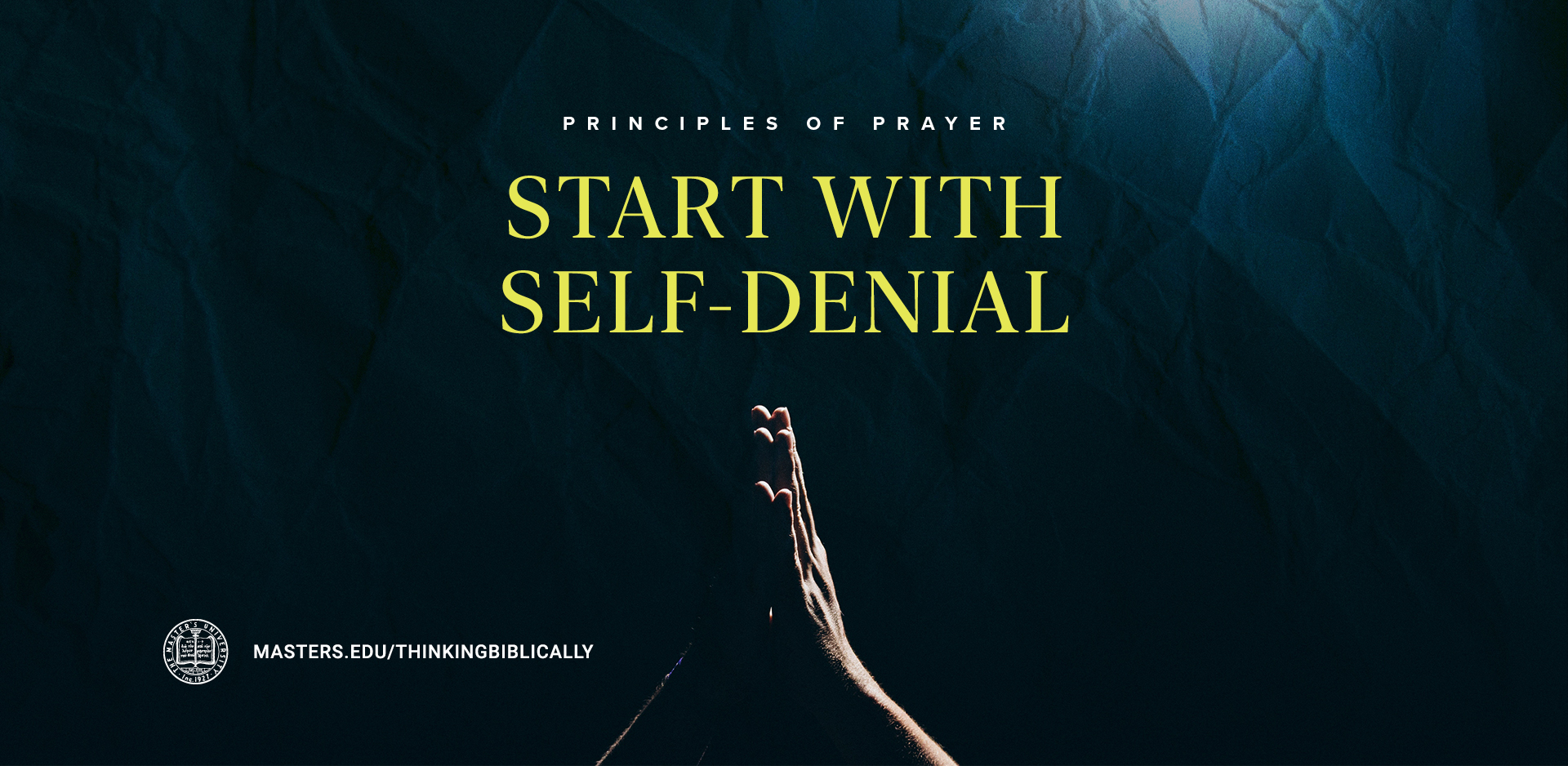
I prayed to the Lord my God and confessed and said, “Alas, O Lord, the great and awesome God, who keeps His covenant and lovingkindness for those who love Him and keep His commandments, we have sinned, committed iniquity, acted wickedly and rebelled, even turning aside from Your commandments and ordinances.
“Moreover, we have not listened to Your servants the prophets, who spoke in Your name to our kings, our princes, our fathers and all the people of the land.
“Righteousness belongs to You, O Lord, but to us open shame.” (Daniel 9:4-7)
As we have seen so far, true intercessory prayer is generated by the Word of God and characterized by fervency. And as we now look at the first recorded words of Daniel’s prayer in Daniel 9, we see the next characteristic: self-denial.
The heart of all true prayer is an initial awareness that you don’t even belong there to begin with. You don’t belong in the presence of God. You don’t have one thing in and of yourself to commend you to Him.
Daniel begins with that recognition. Before he makes any request, he confesses. Contrast this with the prayer of the Pharisee in Luke 18, who prayed, “God, I thank You that I am not like other people: swindlers, unjust, adulterers, or even like this tax collector. I fast twice a week; I pay tithes of all that I get.” (verses 11-12).
Jesus says that God didn’t even hear that prayer (in terms of hearing to respond) because it was self-righteous, self-seeking, and self-confident.
Daniel begins with the recognition that he didn’t belong in the presence of God. Daniel had perhaps searched his whole life and found everything that stood between himself and God — all of the moments in his past when he had been disobedient or deaf to the divine voice. Whatever it was he remembered, it humbled him.
Humility is the only vantage point from which true prayer issues. We see this across Scripture. When Abraham tarried before God in Genesis 18, he said, “Now behold, I have ventured to speak to the Lord, although I am but dust and ashes” (verse 27).
When Isaiah saw a vision of God in chapter 6, he said, “Woe is me, for I am ruined! Because I am a man of unclean lips, and I live among a people of unclean lips; for my eyes have seen the King, the Lord of hosts” (verse 5).
When John saw Jesus in His glory in Revelation, he “fell at His feet like a dead man” (1:17).
If you feel that there is no power in your prayer life, it may be because there is no self-denial. Perhaps you are not reckoning with your own sin before you make your requests. Or perhaps you are neglecting the other aspect of self-denial: setting aside your own will in submission to God’s will. If you are trying to use prayer to badger God into giving you what you want, that’s not self-denial.
Consider this prayer out of “The Valley of Vision”:
I know that I often do thy work
without thy power,
and sin by my dead, heartless, blind service,
my lack of inward light, love, delight,
my mind, heart, tongue moving
without thy help.
I see sin in my heart in seeking the approbation
of others;
This is my vileness, to make men’s opinion
my rule, whereas
I should see what good I have done,
and give thee glory,
consider what sin I have committed
and mourn for that.
It is my deceit to preach, and pray,
and to stir up others’ spiritual affections
in order to beget commendations,
whereas my rule should be daily
to consider myself more vile than any man
in my own eyes.
I don’t think anybody can ever minister to anyone else until they take the path of self-denial. Humility and a willingness to surrender our own wills is a necessary starting point. However, this self-denial is not merely a confession of our own sins as individuals; it involves identifying ourselves with our community. We will look at this aspect of Daniel’s prayer in the next post.

The Master’s University and Seminary admit students of any race, color, national and ethnic origin to all the rights, privileges, programs, and activities generally accorded or made available to students at the school. It does not discriminate on the basis of race, color, national and ethnic origin in the administration of its educational policies, admissions policies, scholarship and loan programs, and athletic and other school-administered programs.
21726 Placerita Canyon Road
Santa Clarita, CA 91321
1-800-568-6248
© 2025 The Master’s University Privacy Policy Copyright Info
| Cookie | Duration | Description |
|---|---|---|
| cookielawinfo-checkbox-analytics | 11 months | This cookie is set by GDPR Cookie Consent plugin. The cookie is used to store the user consent for the cookies in the category "Analytics". |
| cookielawinfo-checkbox-functional | 11 months | The cookie is set by GDPR cookie consent to record the user consent for the cookies in the category "Functional". |
| cookielawinfo-checkbox-necessary | 11 months | This cookie is set by GDPR Cookie Consent plugin. The cookies is used to store the user consent for the cookies in the category "Necessary". |
| cookielawinfo-checkbox-others | 11 months | This cookie is set by GDPR Cookie Consent plugin. The cookie is used to store the user consent for the cookies in the category "Other. |
| cookielawinfo-checkbox-performance | 11 months | This cookie is set by GDPR Cookie Consent plugin. The cookie is used to store the user consent for the cookies in the category "Performance". |
| viewed_cookie_policy | 11 months | The cookie is set by the GDPR Cookie Consent plugin and is used to store whether or not user has consented to the use of cookies. It does not store any personal data. |
Notifications